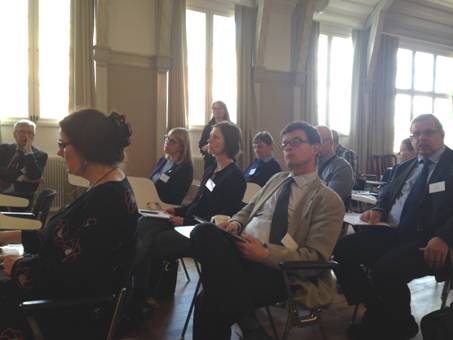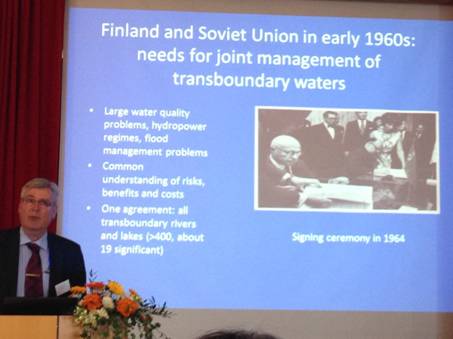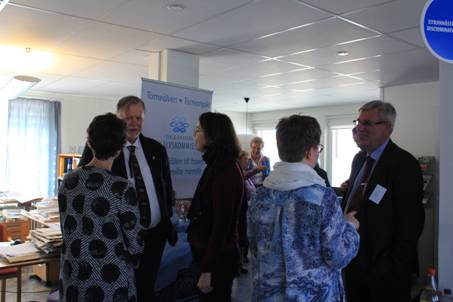MEETING OF THE IMPLEMENTATION COMMITTEE UNDER THE UNECE WATER CONVENTION
Regular meeting of the Implementation Committee under the UNECE Convention on the Protection and Use of Transboundary Watercourses and International Lakes (UNECE Water Convention) was held on 23 and 24 May 2017. The main point of the agenda was the review of the national reports on the implementation of the Convention. Members of the Committee discussed the quality of the national implementation reports submitted by Parties by 20 May 2017 and exchanged on the need for any revisions in the reporting template. By the next Meeting of the Parties to the Water Convention to be held in Kazakhstan in 2018, members of the Committee will prepare the report containing the results of the review.

The meeting of the Implementation Committee took place in Haparanda on the border between Sweden and Finland by the side of the transboundary Torne River. The meeting was organized on invitation and with the support of the Finnish-Swedish Transboundary River Commission and at the personal invitation of Prof. Kari Kinninen (Commission member from Finland). The meeting was preceded by a seminar on the UNECE Water Convention and its Implementation Committee, where the Committee members presented the objectives and mandate of this Convention mechanism and taken actions. In the second part of the seminar the participants took note of the practices of transboundary water commissions in the region. The following presentations were made in this respect:
- “Finnish-Swedish water cooperation” by Johan Antti, Chair of the Finnish-Swedish Transboundary River Commission
- “Finnish-Norwegian water cooperation” by Timo Jokelainen, Chair of the Finnish-Norwegian Transboundary River Commission
- “Finnish-Russian water cooperation” by Seppo Rekolainen, Head of the International Water Cooperation, Finnish Ministry of Agriculture and Forestry.


Experience of those commissions is particularly interesting in part of involvement of the regional and local authorities in transboundary water cooperation. For example, members of the Finnish-Swedish transboundary river commission are appointed from regional branches of respective government authorities and from municipalities, where given transboundary basin is located. This allows operational management and cooperation in situ without the need for permanent involvement of national governments.
Another aspect of interest is re-structuring of the Commission to answer imperatives of our time and solve crucial tasks for riparian countries. Initially, the Commission was established on the basis of the Agreement 1972. The Agreement was focused on the use of transboundary waters for mutual benefits, the support of development of local communities, the conservation of nature and fish stock and the prevention of pollution. Established in 1972, the Commission was a unique example of coupling of international and national legislation. The Commission made its decisions, including issue of permits for water use and pollution based on the norms of international and national legislation.

In 2010, a new agreement was accepted. The basic tasks on the use and protection of water resources for the benefit of the countries and the natural environment were kept in the new agreement; however, significant amendments were made in the Commission’s mandate and tasks. The Commission was renamed as the Finnish-Swedish Transboundary River Commission. Commission’s functions on issue of permits and other obligatory decisions were transferred to national authorities of the both countries. The main focus in operations of the Commission was shifted to promotion of cooperation and development of border regions. Particularly, the Commission shall:
- Develop cooperation between the Parties in the water management area;
- Promote cooperation between the authorities of the Parties in coordinating and reconciling programmes, plans and measures designed to reach the objectives for the status of the aquatic environment and monitoring the status of waters;
- Promote the coordination of planning work by authorities and municipalities of the Parties to prevent flood and environmental damages in the transboundary rivers;
- Promote the coordination and reconciliation of work by authorities and municipalities of the Parties relating to nature conservation plans for the transboundary rivers;
- See that the Parties communicate jointly on the programmes and plans referred to in this Article and hold joint hearings; and
- Adopt or reject proposals for programmes or plans concerning the water management area.
- The Commission shall monitor the application of this Agreement and the permit practices as well as draw the attention of the Parties to any needs to amend the Agreement
SIC ICWC will prepare a brochure to introduce transboundary water cooperation in the Nordic countries to the Central Asian audience.
D.R.Ziganshina from SIC ICWC took part in this meeting.
|